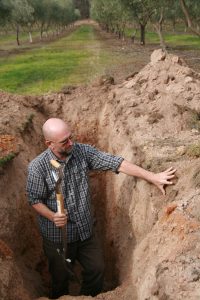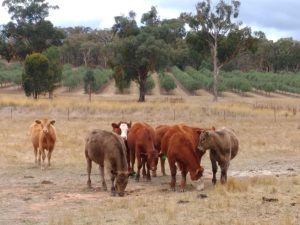Working on erosion solutions
 As part of the ‘Digging Deeper into Watershed Soils’ project local landholders had the opportunity to explore soil health issues within our region at a series of workshops held last week.
As part of the ‘Digging Deeper into Watershed Soils’ project local landholders had the opportunity to explore soil health issues within our region at a series of workshops held last week.
Watershed Landcare invited David Hardwick, Agricultural Ecologist and soil guru, to provide his expertise on some common erosion issues, their causes and solutions, and to provide participants with an understanding of how to implement these solutions and improve the soil health on their own patch.
The workshops focused on improving soil health, the aspects which influence it, and adapting management decisions as a result of understanding the landscape.
One of the properties visited was Karrabool Olives where the owners, David Sargeant and Judy Rogers, wanted to repair erosion and degraded soil in their olive grove. They also wanted David’s insights into how to improve soil fertility for the olives.
The olive grove was planted on the side of a hill, with rows down, rather than across, slope. The top of the hill is poor, gravely soil and supports only some scraggly native vegetation. Runoff is causing sheet and rill erosion through the olive grove.
David’s suggestions included a number of measures to slow the flow of water at the top of the hill. These included putting in a rip line along the fence at the top, allowing the native vegetation to re-establish and utilising olive prunings as a physical barrier to further slow the flow of water at the top of the hill.
Dissipating the water in the olive grove was also an important consideration and the field day participants got their hands dirty, learning how to construct small rock structures to slow and fan out the water flow along the rows of olives.
A soil pit dug to look at the soil structure in the olive grove indicated a layer of compacted soil.
As a long-term management strategy to improve water infiltration and fertility and reduce compaction, David recommended widening the inter-row vegetation to reduce the bare area under the trees and increasing the diversity, particularly with deeper rooted species as olives have shallow roots.
The tactics suggested by David are easy and relatively low cost options that David and Judy can implement before the problem got much more serious. Addressing issues early, or even preventing them when possible, results in manageable solutions. Over time small problems grow and when we are seeing the site everyday it can be easy to not notice the damage that is occurring. Monitoring of your land is the best way to stay on top off changes in your landscape and help you decide when its time to make a change in the way you mange an issue or erosion site.
This project is supported by Watershed Landcare through funding from Landcare Australia and the Jaramas Foundation.

 Then follow us out to the lovely Karrabool Olives on Botobolar Road where David Sargeant and Judy Rogers hope to reduce the runoff which is causing sheet and rill erosion through their olive grove. Here participants can get their hands dirty and learn how to construct small rock structures to slow and spread waterflow.
Then follow us out to the lovely Karrabool Olives on Botobolar Road where David Sargeant and Judy Rogers hope to reduce the runoff which is causing sheet and rill erosion through their olive grove. Here participants can get their hands dirty and learn how to construct small rock structures to slow and spread waterflow.